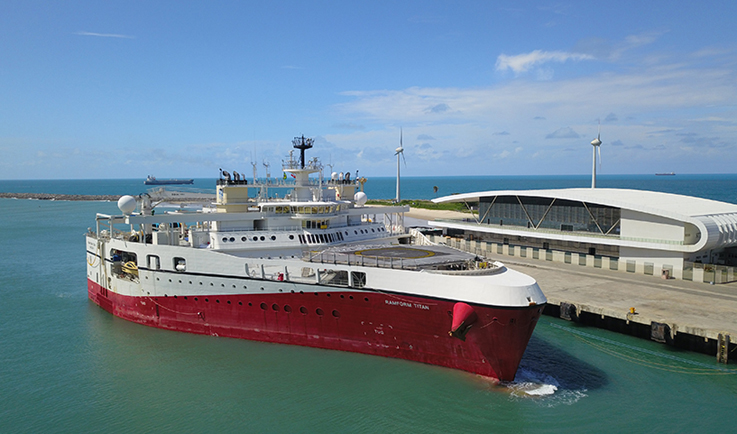
- Segment Revenues of $138.7 million, compared to $215.6 million in Q2 2019
- Segment EBITDA of $99.1 million, compared to $135.2 million in Q2 2019
- Segment EBIT (excluding impairments and other charges) of $7.0 million, compared to $17.7 million in Q2 2019
- Segment MultiClient pre-funding revenues of $66.2 million, with a corresponding pre-funding level of 102%, compared to $66.8 million and 102%, respectively, in Q2 2019
- Cash flow from operations of $67.5 million, compared to $108.1 million in Q2 2019
- As reported revenues according to IFRS of $90.3 million and an EBIT loss of $82.2 million, after impairments of $27.0 million, compared to $192.4 million and EBIT loss of $7.3 million, respectively, in Q2 2019
- Received last installment of $24.2 million from the sale of Ramform Sterling
- Implementing substantial cost measures to address an uncertain market outlook
- In negotiations with lenders to preserve liquidity
Rune Olav Pedersen, President and Chief Executive Officer, commented:
“The Covid-19 pandemic has caused widespread disruptions in the oil market and a significant reduction in energy companies’ 2020 budgets. This has led to reduced demand for seismic data and deferral of seismic projects, requiring a rapid response from PGS to manage vessel supply and costs. . However, client feedback indicates the reduction this year is to protect cash flow and that their exploration models are generally intact with projects deferred rather than cancelled.
During Q2 we cold-stacked PGS Apollo and Sanco Swift, and we have completed the stacking of Ramform Vanguard early Q3. Further capacity reductions will be evaluated, and we are prepared to react quickly. We are in the process of completing a comprehensive reorganization whereby our office based personnel is reduced by approximately 40%, including reductions implemented earlier this year. In combination with other initiatives, these measures are expected to reduce our annual gross cash cost run rate to approximately $400 million, compared to approximately $600 million at the start of the year.
In light of all the challenges we have faced this quarter I am impressed with the exceptional efforts from all our employees. We have been able to execute acquisition and imaging projects according to plan and our sales force has had a relentless drive to close sales, providing us with decent revenues in a very challenging environment.
Resetting our cost base and reducing capital expenditures to a minimum is necessary to preserve liquidity and navigate the current challenging market environment, both operationally and financially. We are in negotiations with the banks supporting our revolving credit facility to seek extension of the scheduled $135 million step down in September, and to amend covenants. We are also in discussions with other lenders to get amortization holidays to further preserve liquidity.”
Outlook
The revised and significantly lower 2020 investment plans among energy companies will significantly reduce demand for seismic services. A majority of the reduction is postponements to 2021, in order for the energy companies to protect cash flow in a period where the Covid-19 pandemic has caused extreme disruptions in the oil market. A large portion of postponed projects relates to either 4D or license commitments and are very likely to proceed when the oil market stabilizes.
The recent partial recovery of the oil price has not caused energy companies to revise their 2020 spending cuts significantly and PGS expects 2020 to be very challenging. If the improved balance in the oil market and recovery of the oil price continues in the second half when most energy companies set their budgets for next year, we expect activity levels to improve in 2021. Despite the impacts of the Covid-19 crisis, energy consumption is expected to continue to increase in the future with oil and gas continuing to play an important role in the energy mix. Offshore reserves will be vital for future supply and support the demand for marine seismic services. The expected future recovery of the seismic industry is likely to be strengthened further by another round of industry capacity reductions and a pent-up exploration and production demand.
Based on current operational projections, with five vessels in operation for the remaining part of 2020, and with reference to disclosed risk factors, PGS expects full year 2020 gross cash costs to be approximately $450 million, excluding severance and other restructuring costs of approximately $35 million.
2020 MultiClient cash investments are expected to be in the range of $175-200 million.
Approximately 50% of 2020 active 3D vessel time is currently expected to be allocated to MultiClient acquisition.
Capital expenditure for 2020 is expected to be approximately $40 million.
The order book totaled $155 million at June 30, 2020 (including $39 million relating to MultiClient). The order book was $217 million at March 31, 2020 and $300 million at June 30, 2019.
KeyFacts Energy Industry Directory: PGS
 KEYFACT Energy
KEYFACT Energy